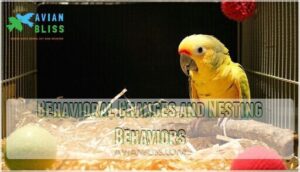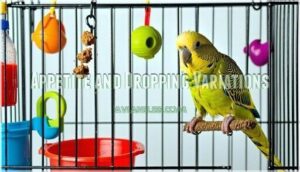This site is supported by our readers. We may earn a commission, at no cost to you, if you purchase through links.

You’ll spot the signs: shredding paper like confetti, guarding her favorite corner with surprising aggression, and dropping larger, less frequent poops.
While it’s natural, chronic laying drains calcium reserves fast, putting your conure at risk for egg binding, brittle bones, and infections.
The good news? You can manage it. Adjusting light exposure, tweaking her diet, and removing nesting triggers help dial down those reproductive instincts before they spiral into a vet emergency.
Table Of Contents
- Key Takeaways
- Causes of Egg Laying in Conures
- Recognizing Signs of Egg Laying
- The Egg Laying Process in Conures
- Health Risks From Frequent Egg Laying
- Caring for Conures During Egg Laying
- Frequently Asked Questions (FAQs)
- Can conures lay eggs without a male present?
- What is the average clutch size for conure eggs?
- How long does conure egg incubation typically last?
- Do conures only lay eggs during breeding season?
- Can male conures lay eggs without a mate?
- How long should I wait before removing eggs?
- What happens if I dont remove the eggs?
- Can egg laying behavior be permanently stopped?
- Do all conure species lay the same number?
Key Takeaways
- Conure egg laying is triggered by hormonal shifts from environmental cues like extended daylight (over 10-12 hours), warm temperatures, and nesting materials—even without a male present—making light control and removing cozy hideaways your first line of defense. – Chronic egg laying drains calcium reserves fast, causing hypocalcemia in up to 80% of seed-only diet birds, leading to life-threatening complications like egg binding (affecting 5-10% of small parrots annually), brittle bones, and reproductive tract infections. – You can spot pre-laying behavior through territorial aggression (62% of conures), compulsive paper shredding (84%), restless pacing in the 48 hours before laying (70%), and dramatically larger droppings as the body redirects resources toward egg production. – Managing chronic laying requires a multi-pronged approach: limiting light to 8-10 hours daily, providing calcium-rich foods and cuttlebone, rotating toys weekly to disrupt nesting fixation, and seeking veterinary intervention early—hormone therapy reduces laying frequency by up to 85% when needed.
Causes of Egg Laying in Conures
Understanding what triggers egg laying in your conure isn’t just about biology—it’s about taking control of your bird’s health and well-being.
So what actually flips that reproductive switch? It comes down to a handful of factors, everything from hormones to what’s in the food bowl.
Hormonal Changes and Seasonal Triggers
When your conure’s body senses longer daylight hours or warmer temperatures, her reproductive hormones kick into overdrive—even without a mate in sight. This hormonal surge mirrors wild breeding cycles, where seasonal changes signal ideal conditions for raising chicks.
Spring and summer are peak breeding season for a reason: extended light exposure flips the hormonal switch. Managing this means controlling her environment—think shorter days, around 8-10 hours of light.
Rich diets can also fuel egg production, so nutrient balance matters too.
Environmental Influences and Nesting Cues
Your conure’s environment can trigger breeding mode just as much as hormones—and you might not even notice it happening. Nesting boxes, dark corners, and cozy spots all look like perfect breeding sites to your bird.
How long you keep the lights on matters too. More than 10–12 hours of light per day tells your conure it’s breeding season. And those cuddle sessions? Petting your bird’s back or under the wings sends mating signals you probably didn’t mean to send.
Toys and enrichment are great, but here’s a trick: rearrange them regularly. Disrupting the setup helps prevent your conure from settling into nesting mode before it even starts.
Dietary Factors Affecting Reproduction
What you feed your conure directly shapes its reproductive drive. High-quality diets rich in protein (around 16.5–18%), balanced calcium supplements (0.3–0.9% in pellets), and adequate Vitamin D can trigger or intensify egg laying by signaling abundant resources.
Mineral ratios, especially calcium to phosphorus above 2:1, assist eggshell formation but require careful management. Products like Harrison’s Bird Food offer nutrient balance that influences conure egg laying behavior, making pet bird nutrition a powerful lever in managing reproduction.
Understanding calcium requirements is vital for maintaining ideal health and reproductive balance in conures.
Health Issues Linked to Egg Laying
When your conure lays eggs repeatedly, you’re looking at real health risks—not just minor issues. Each laying cycle strips calcium from her system, and over time, that deficiency can lead to weak bones or even metabolic failure.
Repeated egg laying strips calcium from your conure’s system, leading to weak bones and potentially fatal metabolic failure
Here’s what chronic laying can trigger:
- Hypocalcemia and osteoporosis – up to 80% of birds on seed-only diets develop calcium deficiency after repeated cycles
- Egg binding – affecting 5-10% of small parrots annually, this life-threatening emergency requires immediate veterinary care
- Reproductive tract infections – bacterial invaders strike up to 25% of chronically laying birds
The root cause? Hormonal imbalance. It throws off your bird’s nutritional needs and creates a cascade of sun conure health problems that can cut her life short. Calcium isn’t just important—it’s critical. Understanding the causes of chronic egg laying is vital to preventing these complications.
Recognizing Signs of Egg Laying
You’ll notice specific changes in your conure’s behavior when she’s preparing to lay eggs. Watch for nesting behaviors, shifts in appetite and droppings, and distinct physical or vocal changes that signal her reproductive cycle has begun.
Behavioral Changes and Nesting Behaviors
Watch for dramatic shifts in how your conure acts when egg laying approaches. Up to 62% of conures show increased territorial behavior, lunging or biting near chosen nest sites.
You’ll notice about 84% shred paper or toys to prepare nesting areas, while 70% pace restlessly in the 48 hours before laying. Vocal changes appear in 78% of females—expect louder, repetitive calls followed by stretches of unusual silence.
Many conures withdraw socially, hiding under cage liners or seeking dark corners as hormonal behavior peaks, making these pre-laying activity patterns unmistakable signs you can’t ignore when discouraging egg laying.
Appetite and Dropping Variations
Your conure’s eating habits might shift noticeably—some birds develop a ravenous appetite while others pick at their food—and you’ll see her droppings grow larger and bulkier as her body channels resources toward egg production.
These dropping changes result from hormonal behavior redirecting nutrient balance toward shell formation. Watch for subtle shifts in dropping color too—you’re looking at a bird whose system is under metabolic stress, demanding calcium and protein reserves that impact both feather condition and overall conure behavior and health during egg laying cycles.
Physical and Vocalization Differences
Changes to your conure’s body and voice are impossible to overlook when she’s gearing up to lay eggs.
If her abdomen looks swollen or noticeably rounded, that’s a surefire sign, no matter what type of conure you have.
Beyond shifts in appetite and droppings, your conure’s body and voice will telegraph the hormonal storm of egg production in ways you can’t miss. Watch for a swollen, distended abdomen—a clear visual cue across all conure species and types.
Body posture changes, too: she’ll crouch lower, tail elevated. Vocalizations shift toward softer, repetitive chirps instead of her usual vocal range.
Some conure characteristics include subtle beak coloration changes and feather patterns appearing slightly disheveled during this reproductive phase.
The Egg Laying Process in Conures
Your conure’s body goes through specific stages when it comes to egg production. Knowing what happens—and what’s typical—makes it easier to spot when something’s wrong.
Let’s walk through the stages of egg formation, how often eggs appear, and what healthy eggs actually look like.
Let’s break down the stages of egg formation, how often you can expect eggs, and what those eggs should actually look like.
Egg Formation and Development Stages
Understanding what happens inside your conure’s body before an egg appears can help you recognize the physical demands—and potential dangers—this process puts on her system.
Egg formation unfolds in distinct stages over about 24 to 48 hours:
- Yolk formation begins in the ovary, where your bird’s body deposits calcium and nutrients
- Albumen secretion wraps the yolk in protective layers as it moves through the oviduct
- The shell gland mineralizes the outer shell using calcium stores—this stage drains your conure’s reserves fast
- Without adequate Vitamin D3, cuttlebone, or a mineral block, nutritional deficiencies can halt development or cause dangerous complications
Embryo development and the hatching process only occur if eggs are fertilized and properly incubated.
Frequency, Clutch Size, and Timing
In captivity, most conures lay three to four clutches per year, with each batch containing three to five eggs spaced roughly a day apart.
Your bird’s breeding season usually peaks in spring when daylight increases, though indoor lighting can blur these yearly cycles.
Incubation spans 22 to 26 days, and you’ll notice peak times often align with hormonal surges tied to environmental cues rather than strict seasonal rhythms.
Egg Appearance: Size, Shape, and Color
Once you see that first egg in your conure’s cage, you’ll notice it’s surprisingly small—about the size of a large jellybean—with a smooth, almost porcelain-like shell that’s usually white or slightly off-white in color.
The eggshell texture feels firm but delicate, and while most eggs in a clutch look similar, you might spot subtle color variations or shape abnormalities that signal nutritional deficiencies or stress during egg formation—flags worth discussing with your avian vet.
Health Risks From Frequent Egg Laying
If your conure keeps laying eggs, it’s more than just tiring—it can actually put her health at risk. Here’s what you need to keep an eye on.
When your conure lays eggs too often, it’s not just exhausting—it’s dangerous. Let’s break down the specific health threats you need to watch for.
Calcium Deficiency and Bone Health
Egg formation demands huge amounts of calcium—up to 90% pulled directly during the laying period. When your conure’s diet falls short, her body raids skeletal reserves, draining bone mineral density with every clutch.
This sets up a dangerous cascade: weaker bones, eggshell defects in over half of eggs laid, and clinical signs like tremors or muscle weakness.
Dietary supplementation isn’t optional—it’s your frontline defense against health complications that can sideline even the liveliest conures.
Egg Binding and Associated Complications
When calcium reserves drop too low, your conure faces an even more urgent threat: egg binding. This occurs when an egg lodges in the oviduct and can’t pass through.
Clinical signs include lethargy, abdominal straining, pelvic limb paralysis, and respiratory distress. Mortality rates hit 28–32% within 72 hours if untreated. Risk factors like obesity, poor muscle tone, and hormonal imbalance compound the danger.
Treatment options range from medical management to surgical removal, with early veterinary intervention improving outcomes by 78%. Recurrence prevention requires addressing reproductive triggers and, in some cases, hormonal suppression to protect against prolapsed oviduct and other reproductive disorders.
Infections, Malnutrition, and Reproductive Disorders
When egg binding doesn’t resolve or prevention fails, your conure faces a cascade of other serious health threats that can compromise her long-term wellbeing. Avian infections like yolk coelomitis can develop rapidly when eggs rupture internally.
Nutritional deficiencies—especially calcium and vitamin A depletion—lead to malnutrition and weaken immune function.
Reproductive disorders, including prolapse issues and reproductive tumors, become more likely with repeated egg-binding risks and chronic laying cycles.
Caring for Conures During Egg Laying
Egg-laying puts serious strain on your conure’s body. You’ll want to make some changes to her routine—both to keep her healthy right now and to prevent this from becoming a regular thing.
When your conure’s laying eggs, you’ll need to adjust her care to protect her health and discourage future cycles. Here’s what to focus on during this demanding time.
Environmental and Cage Adjustments
The best way to protect your conure from these health problems? Change their daily environment—what they see, what they can access, and how they spend their time.
Remove any nest boxes or dark, enclosed hideaways that flip the breeding switch. Cut light exposure down to 8-10 hours a day to disrupt the hormonal cycles driving this behavior.
Swap out toys every week and move perches around. This keeps your conure’s brain busy exploring instead of fixating on nesting. Simple changes, real results.
Rotate toys weekly and rearrange the cage layout to prevent nesting fixation—this simple trick resolves privacy needs while keeping your conure mentally engaged and less focused on reproduction.
Dietary Support and Supplementation
Nutrition is critical to your bird’s reproductive health. During egg-laying, your conure’s calcium requirements skyrocket—laying birds need 15–30 mg/dL serum calcium versus just 8–10 mg/dL normally.
Provide calcium sources like leafy greens (kale, broccoli), cuttlebone, and pelletized foods fortified with vitamin D3 for proper absorption. Boost protein intake with cooked eggs and legumes to supply essential amino acids.
A diverse diet—75–80% pellets, 30–40% fresh produce—prevents nutritional deficiencies that cause egg-binding and weak shells.
Stress Reduction and Enrichment
Stress—invisible yet powerful—can turn a hormonal hen into a relentless egg layer, so mastering your bird’s environment isn’t just helpful, it’s essential.
Rotate foraging toys weekly to disrupt nesting routines and redirect parrot behavior. Daily social interaction and training benefits reduce behavioral issues by channeling energy away from reproduction.
Maintain routine stability with consistent sleep schedules and cage enrichment that discourages behavioral changes tied to stress reduction.
Veterinary Monitoring and Intervention
Nobody should navigate egg-laying episodes alone—veterinary exams form your strongest line of defense against reproductive disorders. Annual checkups detect hormonal imbalance early, while weight monitoring during active laying tracks metabolic stress (even 3-5% loss matters).
When medical intervention becomes necessary, your options include:
- Egg-binding treatment with injectable calcium and fluids—resolving over 90% of cases when caught promptly
- Hormone therapy using leuprolide acetate, reducing laying frequency by up to 85%
- Surgical options like salpingectomy for chronic, refractory cases
- Emergency protocols for life-threatening complications, where delayed care increases mortality by 68%
Always seek veterinary advice for birds showing straining, lethargy, or abnormal clutch patterns—timely action increases recovery rates by over 75%.
Frequently Asked Questions (FAQs)
Can conures lay eggs without a male present?
Yes—your conure can absolutely lay eggs without a male present. Like clockwork, her body produces unfertilized eggs driven by hormone triggers and the fertility window, regardless of mating.
This natural aspect of avian reproduction means laying eggs occurs even in solo hens, though egg composition and hen health require close monitoring during each laying frequency cycle.
What is the average clutch size for conure eggs?
Most conures lay three to five eggs per clutch, with intervals of approximately one day between each egg. Understanding typical clutch size helps you monitor your bird’s reproductive health and recognize when intervention might be needed.
| Breeding Aspect | Typical Range | Clinical Notes |
|---|---|---|
| Typical clutch size | 3–5 eggs | Variation exists between species |
| Egg laying intervals | 24–48 hours | Consistent timing indicates health |
| Clutch frequency | 3–4 per year | Excessive frequency depletes calcium |
| Incubation period | 22–26 days | Fertile egg age matters after maturity |
Under normal captive conditions, conures generally produce three to four clutches annually. Avian reproduction becomes viable around two years of age, when fertile eggs are more likely. Breeding behavior can emerge even without a male present, though these eggs remain infertile.
Monitor your conure closely during egg laying—chronic cycles increase risks of calcium depletion, egg binding, and metabolic exhaustion that threaten her long-term health.
How long does conure egg incubation typically last?
Once eggs are laid, the incubation timeline usually spans 22 to 26 days before hatching begins.
Throughout this period, parental roles involve maintaining proper humidity levels and temperature, essential for healthy chick development within each clutch of eggs during avian reproduction.
Do conures only lay eggs during breeding season?
In the wild, seasonal cues drive breeding, but captive conures often lay year-round.
Hormonal influence from environmental factors like extended daylight, rich diets, and nesting materials can trigger egg laying regardless of season, making captive breeding unpredictable without careful management.
Can male conures lay eggs without a mate?
No—male conures don’t lay eggs without a mate because male anatomy lacks the reproductive structures needed for egg production.
Only females lay eggs, and they can do so without a male through hormonal imbalances triggered by environmental or dietary factors.
How long should I wait before removing eggs?
Timing egg removal hinges on your goal. If you’re discouraging laying eggs, wait 14–21 days—this allows your conure’s hormonal cycle to complete naturally. Immediate removal often triggers replacement clutches, perpetuating the breeding behavior cycle.
Here’s your action plan:
- Leave eggs untouched for two weeks minimum to satisfy parental behavior instincts
- Monitor incubation stages carefully—fertility considerations matter if multiple birds are present
- Remove all eggs simultaneously after the waiting period to avoid staggered hormonal responses
- Eliminate nesting materials immediately to discourage further avian reproduction attempts
- Consult your avian veterinarian if egg laying persists beyond normal patterns
This ethical approach respects your bird’s reproductive physiology while protecting her from metabolic exhaustion and calcium depletion.
What happens if I dont remove the eggs?
If you don’t remove the eggs, your conure may continue incubation behaviors, triggering parental behavior and continued laying.
This cycle increases risks like egg binding, calcium depletion, and reproductive disorders, threatening avian health and breeding complications.
Can egg laying behavior be permanently stopped?
You’re not doomed to endless eggs—but stopping egg laying permanently isn’t as simple as flipping a switch. Hormonal treatments for birds and surgical options like spaying conures can minimize reproductive disorders, though results vary.
- Hormone therapy (like deslorelin implants) temporarily suppresses hormonal imbalance but requires repeated use
- Chemical castration offers short-term relief without long-term effects guaranteeing permanent cessation
- Surgical spaying provides the most definitive solution, though it carries anesthetic risks
Discouraging egg laying in birds through environmental management remains your safest first step.
Do all conure species lay the same number?
Not exactly—species clutch variation exists among conures. Breeding age, fertility rates, and incubation period remain fairly consistent, but egg size differences and clutch of eggs vary slightly by conure species identification, with most laying three to five eggs per breeding cycle.
If your conure starts shredding paper, acting out aggressively, or their droppings change, those can all be signs she’s gearing up to lay eggs.
Spotting these early gives you the chance to step in—adjust the lighting, tweak her diet, and make a few changes around her cage before things get out of hand.
Managing conure egg laying behavior means mastering monitoring, modifying, and maintaining your bird’s reproductive rhythms. By recognizing the signs—shredding, aggression, altered droppings—you can intervene early with light adjustments, dietary tweaks, and environmental changes.
Don’t let chronic laying drain your conure’s calcium reserves or risk egg binding. Stay vigilant, consult your avian vet when needed, and give your feathered friend the balanced, enriched life she deserves beyond breeding season’s demands.
- https://talkieparrot.com/info/how-often-do-conures-lay-eggs/
- https://lafeber.com/pet-birds/questions/green-cheek-egg-laying/
- https://voren.com/articles/popular-conures-and-their-breeding-habits/
- https://birdtricksstore.com/blogs/birdtricks-blog/how-parrots-mate
- https://onlinelibrary.wiley.com/doi/10.1111/brv.12931











